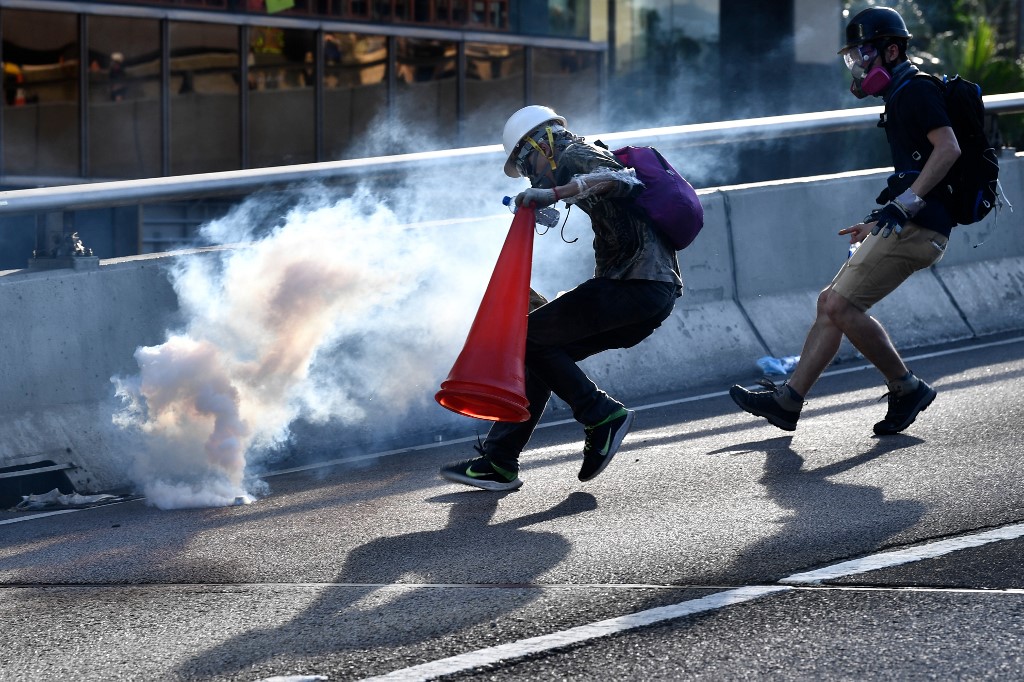
This file photo taken on August 5, 2019 shows a protester preparing to cover a tear gas canister fired by the police with a traffic cone in the Admiralty district of Hong Kong during a general strike, as simultaneous rallies were held across seven districts. (Photo by Anthony WALLACE / AFP)
HONG KONG — As a tear gas canister clatters onto a street in Hong Kong, a pro-democracy protester wearing heat-proof gloves and carrying a traffic cone sprints from the crowd to put it out.
Police have ramped up their use of the crowd control measure as two months of rallies in the global financial hub have turned increasingly violent, peaking with 800 rounds fired on Monday in what protesters called a “tear gas buffet”.
Hardcore demonstrators are responding with ever more creative methods to neutralise the threat, harnessing everything from traffic cones to kitchenware.
Their arsenal includes several must-haves: heat-resistant gloves, so they can pick up searingly hot canisters, and respirators that have been dubbed “pig snouts” in Cantonese.
Online forums host discussions on which models of 3M respirator filters work best against tear gas, and which local hardware stores still have the preferred models in stock.
“I really need to get one! The good masks are already very hard to find on the street,” wrote one commenter.
On the streets, protesters compare notes on their equipment and offer tips.
After police fired tear gas at protesters hurling bottles and bricks on Monday, one bystander gasped and rubbed his eyes, attracting the attention of a passing demonstrator who handed him a mask.
“This one’s not the good one but it will work,” he said. “You’ve always got to carry one!”
Tactical response
Demonstrators have formed special “units” in charge of tackling tear gas, which leap into action as soon as a canister is fired.
Some wrap their arms and legs in cling wrap to prevent the painful skin irritations that the gas and pepper spray can cause, and they carry saline to rinse the eyes of anyone affected.
Canisters are sometimes picked up and lobbed back at police or extinguished straight away with water bottles.
Some carry traffic cones, which can be popped on top of canisters to contain the gas before protesters douse them with water.
Months of street battles against police have allowed protesters to develop a sophisticated response to crowd control techniques, said Tony Davis, a Bangkok-based security analyst with IHS Jane’s.
“What’s happening in Hong Kong allows the protesters to learn and they’re developing skills,” he said. “They’re becoming in a sense, an organised army, which they certainly weren’t in the first phase.”
They might be an “army”, but their equipment is mostly improvised, with one recent tool of choice coming straight from the kitchen.
When police fired tear gas at residents in the working class neighbourhood of Wong Tai Sin, a local grabbed a cheap aluminium wok lid to snuff out the gas.
The cooking lids have now become standard issue for some protesters — part of an arsenal that also includes umbrellas and even swimming goggles to protect against pepper spray.
While tear gas is a common crowd control method worldwide, it had rarely been seen in Hong Kong before the latest protest movement.
Its use during the Occupy Central blockade of city streets in 2014, the city’s last period of civil unrest, caused widespread outrage.